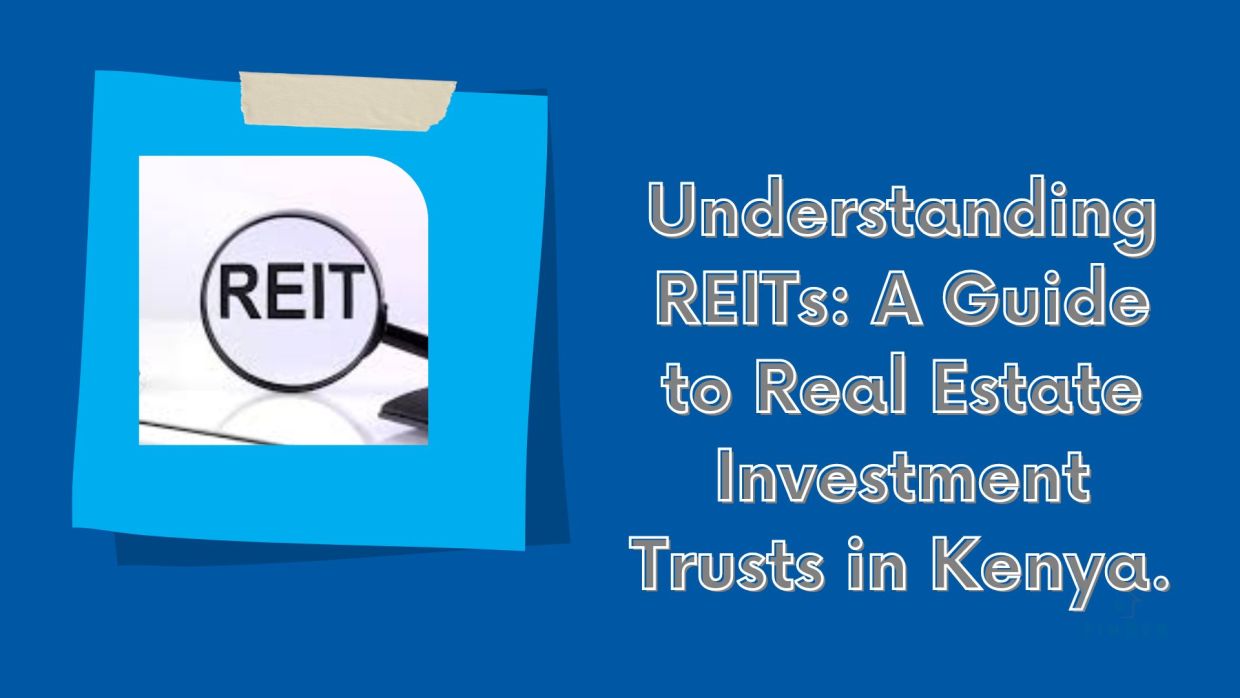Understanding REITs: A Guide to Real Estate Investment Trusts in Kenya.
Real Estate Investment Trusts (REITs) are a popular investment vehicle for those who want to invest in the real estate sector without the hassle of buying and managing physical properties. In Kenya, there are two types of REITs: Development REITs and Income REITs. Development REITs buy, develop, and construct projects, with the aim of selling units and sharing capital gains with shareholders. Income REITs invest in long-term real estate assets and offer dividends based on the performance of the properties in their portfolio.
Legal Framework Governing Real Estate Investment Trusts in Kenya
REITs are regulated by the Capital Markets Authority in Kenya. The legal framework governing REITs in Kenya was introduced in 2013, and it provides a framework for the establishment, operation, and management of REITs. This framework ensures that investors are protected and that REITs operate in a transparent and accountable manner.
REITS Association of Kenya (RAK) promotes the growth of REITs in Kenya by establishing a development framework, creating engagement forums, partnering with other REITs Associations worldwide, and facilitating knowledge transfer and learning experiences.

How REITs Work in Kenya
When it comes to investing in a real estate investment trust (REIT), there are several key players involved in the process. Here are the main offices you will encounter:
1. Unit Holder/Investor: This is the person or entity that owns shares in the REIT, and therefore is entitled to a portion of the income and profits generated by the properties in the portfolio.
2. Trustee: The trustee is responsible for ensuring that the REIT is managed according to its stated objectives and in the best interests of its unit holders. They also oversee the appointment of the asset and property managers.
3. Asset Manager: The asset manager is responsible for managing the REIT's investments, including selecting properties to purchase, managing the portfolio, and selling properties as necessary.
4. Property Manager: The property manager is responsible for the day-to-day management of the properties in the REIT's portfolio, including maintenance, repairs, tenant management, and rent collection.
5. Promoter: The promoter is the company or individual that creates the REIT and raises capital from investors. They may also be involved in managing the REIT, depending on the structure of the organization.
For example, let's take a look at Laptrust Imara I-Reit. Laptrust is the promoter, while The Co-operative Bank of Kenya serves as the trustee. Sterling Reit Asset Manager manages the REIT's investments, while Laser Property Services is responsible for managing the properties in the portfolio. The properties in the portfolio include CPF Metro Car Park, Pension Towers, CPF House, Man Apartments, Nova Pioneer Eldoret, Freedom Heights Mall, and Freedom Heights Service Plot. By investing in this REIT, unit holders can expect to benefit from the income and profits generated by these properties.
Investing in REITs is similar to investing in stocks. An investor buys shares in a REIT and earns dividends and capital gains. Each REIT has a unique structure, and different requirements for purchasing the same. For instance, ILAM Fahari I-REIT is traded on the Nairobi Stock Exchange as a share, while Laptrust Imara I-REIT is trading at KES 20.00, with a minimum investment of KES 5,000,000. For private placement REITs, the minimum amount per share is KES 4,000,000. Therefore, investors need to understand the unique requirements of each REIT before investing.
Joining REITs in Kenya
Joining a REIT in Kenya is easy. Simply reach out to the REIT management or a licensed stockbroker to purchase shares. The minimum investment amount varies depending on the REIT, but it ranges from a few thousand to millions of Kenyan shillings.
Best REITs in Kenya
The best REITs in Kenya include:
- Acorn I-REIT,
- ILAM Fahari I-REIT, and
- Laptrust Imara I-REIT.
These REITs have a proven track record of generating attractive returns for investors.
Taxation of REITs in Kenya
REITs in Kenya are subject to income tax, value-added tax (VAT), and withholding tax. However, REITs are exempt from income tax on income derived from property rental income, provided that they distribute at least 80% of the income to shareholders. Additionally, REITs are exempt from VAT on the supply of real estate services.
Returns on REITs in Kenya
REITs in Kenya have been generating attractive returns for investors. For instance, Acorn I-REIT declared a dividend of KES 0.50 per share/unit at the end of March 2023, with a price per unit of KES. 20.88. Laptrust Imara I-REIT is trading at KES 20.00, with a minimum investment of KES 5,000,000.
Challenges in Using REITs for Real Estate Investment in Kenya
Real Estate Investment Trusts (REITs) offer a unique opportunity for investors to gain exposure to real estate without having to own physical property. While REITs have the potential to support the provision of more housing under the Presidential Four Agenda Programme and affordable housing in Kenya, there are also some challenges that investors need to consider.
One challenge is that REITs may grow at lower rates than traditional companies due to the restriction on re-investing a maximum of 20% as the rest is distributed as dividends. This can limit the REIT's ability to expand its real estate holdings and may result in lower returns.
Another challenge is that debt financing for REITs could result in high interest rates, which can affect the profitability of the investment. Investors need to be aware of the risks involved in debt financing and the impact it could have on their returns.
In addition, REITs are subject to the real estate market cycle, which may experience market volatility from time to time as a result of changes in the economy, government regulations, or political activity. It is essential for investors to conduct thorough due diligence before investing in REITs to understand the market conditions and the underlying real estate assets.
Despite these challenges, REITs offer a tax-efficient structure and have opened up the real estate investment market to a larger population segment in Kenya. If appropriately promoted, REITs have the potential to contribute significantly to the achievement of the provision of more housing under the Presidential Four Agenda Programme and affordable housing in Kenya.
Conclusion
In conclusion, REITs are a great investment vehicle for those looking to invest in the real estate sector in Kenya. With the legal framework governing REITs, investors are assured of transparency and accountability. Joining a REIT is easy, and investors can choose from a range of REITs with different investment requirements.
To learn more about REITs in Kenya and how to invest, reach out to the REIT management or a licensed stockbroker today. Investors should seek professional advice and consider their investment goals, risk tolerance, and investment horizon before investing in REITs. It is also essential to monitor the market conditions and the underlying real estate assets to make informed investment decisions.



